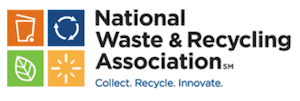
China’s Recyclable Materials Import Standards and Ban
NWRA POSITION
NWRA urges the Chinese government to phase in its new stringent standards for recyclable materials over a period of five years to allow the global recycling community to adapt to the new standards and in the interim establish internationally recognized standards.
BACKGROUND
China historically has imported large quantities of recyclable materials from the United States to be processed and used in their manufacture of new products. This has been a mutually beneficial relationship given that the U.S. market for consumer recyclables commodities has lower demand. However, China has begun closing its doors to the import of recyclables, posing a threat on several levels.
In 2017, China announced that it would impose a standard for certain recyclable materials of no more than 0.5 percent contaminants, far below industry standards. Simultaneously, it also banned the importation of several categories of curbside recycled materials such as post-consumer plastics (e.g. water bottles, shampoo bottles, yogurt containers, etc.) and mixed paper (e.g. bundles of unsorted magazines, newspapers, and office paper.)
China’s ban, which became effective March 1, 2018, on the import of recyclable materials that do not meet this impractical standard has shown a significant impact on the waste and recycling industry in the United States and Canada. Further, it could eventually lead to the loss of tens of thousands of jobs and closure of many recycling businesses throughout North America.
NWRA supports the efforts of the Chinese government to improve environmental protection and standards within its recycling infrastructure. However, its decision to ban the importation of recyclable materials that do not meet its impractical standard will have a significant impact on the waste and recycling industry. Not only does this ban impact the recycling industry in the United States, but also the Chinese manufacturing industry that relies heavily on those materials. This could prove disruptive to the entire supply and demand balance for these commodities.
NWRA believes there are better ways to achieve China’s goal of improving its environment than to place unrealistic restrictions on imported recyclables. The association has requested that the Chinese government phase in its new requirements over a period of five years to allow time for the global recycling community to adapt to the changes. NWRA also has urged the Chinese government to adopt international standards and has expressed concern that the environment would be the biggest loser when recycling programs fail and manufacturers revert to using resource intensive virgin materials.
These internationally recognized standards were developed with the input of processors and end users to ensure that end users receive a high-quality product that can be utilized in their manufacturing while at the same time considering the limitations of recycling processors. China has historically consumed over 50 percent of the world’s recyclable paper and plastic feedstock. Given the amount of recyclable materials shipped to China, there currently is not enough global capacity to absorb the unsorted paper and post-consumer plastics that are now banned.
The fallout from this ban could have a devastating effect on recycling that may set the industry back decades. Already, this has depressed the costs of these materials. In addition, the lack of markets for some of the materials altogether has resulted in them being stockpiled or, in some cases, landfilled. This could shake public confidence and create long term consequences in material quality and segregation efforts.
TALKING POINTS
- NWRA respectfully requests that the Chinese government reconsider their new standards and import ban and instead enforce strict, reasonable standards on high quality materials.
- NWRA supports use of trade incentives for other nations to import U.S. recyclables.
- Tax credits, block grants, and regulatory relief should be used to encourage the development of a domestic market for consumer recyclables as well as for research and education.
Updated January 2019.

